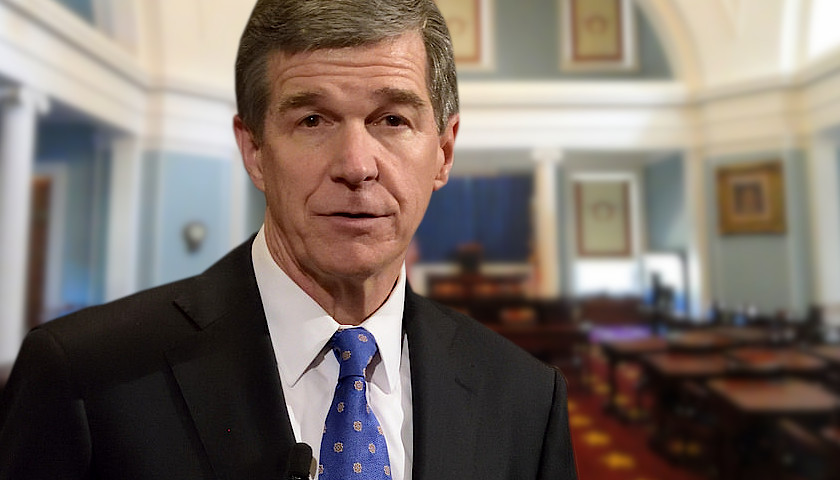North Carolina’s Democratic Governor Roy Cooper recently said that a $15 minimum wage is an ‘admirable goal’, however, wants to see “how high we can get it.”
WRAL reported:
Gov. Roy Cooper called Wednesday for an increase in North Carolina’s minimum wage and said it need not be the $15-an-hour phase-in many Democrats have called for.
“We need to work with the General Assembly to see how high we can get it,” Cooper told WRAL News. “$15 is an admirable goal.”
According to the WRAL report, Governor Cooper made these remarks “in a morning speech to the AFL-CIO and from a brief conversation with WRAL News afterward.”
The report by WRAL also states that Cooper “endorsed, in broad strokes,” the AFL-CIO’s legislative priorities and that he said that the AFL-CIO’s priorities list “align with the mission” he has established.
It’s unclear exactly what “mission” Cooper is referring to, however, a set of incremental wage hikes he appears to endorse combined with the tax hikes he has called for would likely torpedo the promises made in his “jobs plan.”
“What we need is a leader with a laser focus on creating good paying jobs and lifting wages,” Cooper’s campaign website reads.
On the website under Jobs, he also says that “Small businesses are a vital component of our economy.”
Yet, small business is the most adversely affected by coercive wage hikes.
Cooper also promised on his website that “We can and should put regulations under consumer and efficiency reviews that make it less burdensome for small businesses to comply with the law while also protecting people and honest businesses from bad actors.”
Cooper’s endorsement of manufactured increases in the minimum wage would seem to be a burdensome regulation for small business to comply with.
Artificially manipulating wages has never been had successful outcome supporters of such measures claim. One can go all the way back to the first minimum wage hike under President Franklin D. Roosevelt. Workers were laid off across the country as the new wage hike was written into law.
Minimum wage hikes hit small and medium businesses hardest. The cost of labor is usually 2/3 of a small business’s overhead costs. Raising that cost means cutting back on staff, products, locations or all three.
Undertrained, Low-skilled, young (teen) or immigrant workers are the first to be laid off, which in turn jacks up the unemployment rates. Industries that tend to cut back on staff or close altogether are the very industries the “Fight for $15” campaigns claim to champion – Retail stores and food service.
In 2018, fast food chains began opting for automated ordering systems. Even more upscale establishments like Chili’s cut wait staff in favor of table-side payment systems which have a minimal one-time implementation cost. Another chain, Red Robin, slashed their busboy staff in around 570 of their restaurants in order to keep up with imposed wake hikes.
A study conducted by American Action Forum (AAF) found that the minimum wage hikes implemented just in 2018 alone will cost the U.S. roughly 261,000 jobs.
The AAF study shows that once the phased minimum wage increases being implemented in other states are complete, approximately 1.7 million jobs are expected to be lost.
The hikes discussed by the AAF study are incremental, just like the wage hikes being proposed in the recently filed North Carolina House Bill 46. This is the bill that Governor Cooper is referring to in the WRAL report.
In addition to hiking the minimum wage on Labor Day over the course of 5 years, House Bill 46 includes many other ‘progressive wish list’ items:
- Require mandatory paid sick leave and family medical leave.
- “Mandate” equal pay for equal work regardless of experience or education.
- Increase the ‘tipped’ minimum wage.
- End “wage theft.”
- “Ban The Box” or which is removing the checkbox indicating a criminal record on employment applications.
- Bar public employers from looking into the criminal history of an applicant until a ‘conditional’ offer is made.
- Remove the ban on unions for public employees in the state.
- Reinstate the earned tax credit.
- Reinstate the old child care tax credit and old employment expense tax credits.
Just days ago, the NC AFL-CIO gave an award to one of the two Democrats who filed House Bill 46.
Congratulations Rep. @SusanFisher114, our 2019 'Friend of Working People" Award winner! Thanks for being a champion of raising wages and empowering workers! #ncga #ncpol #1u #countmein pic.twitter.com/ORToZyud3k
— NC State AFL-CIO // #CountMeIn (@NCStateAFLCIO) February 13, 2019
These types of state-forced wake hikes also have a ripple effect on the economy. With fewer dollars being earned, fewer dollars are being spent. That reduction in consumer spending, in turn, demand drops, supplies are cut, and that leads to even more business closures. Those closures then send more people into the unemployment lines.
It is, therefore, no small wonder that alongside his apparent call for a minimum wage to exceed $15 an hour that Governor Cooper also wants to increase unemployment benefits.
WRAL’s report says that Cooper called the state’s unemployment benefits “quite stingy” but didn’t call for a cap increase. Cooper wants the duration of payments to be extended instead.
The current cap is $350 a week. According to the state’s Division of Employment, a person can receive anywhere between 5 and 20 weeks of regular unemployment benefits in North Carolina. Using the maximum figures, that means $7,000 could be received over a 20 week period.
Roy Cooper’s mission may align more closely with the AFL-CIOs legislative wish list by design. In December of 2017, Cooper appointed the President of the North Carolina State AFL-CIO, MaryBe McMillan, to the NCWorks Commission.
The NCWorks Commission “recommends policies and strategies that enable the state’s workforce and businesses to compete in the global economy.”
The mission of NCWorks to make sure the state has a workforce and plan that will help the state to “achieve and sustain economic prosperity.”
The North Carolina AFL-CIO has donated to Roy Cooper’s campaigns in 2000 and in 2016. Each time the donation was $500.
The NC AFL-CIO and McMillan helped activists propel the formation of a “Workers Rights Commission” in Durham.
“YOU did this!” NC State AFL-CIO Pres. MaryBe McMillan thanks working people in #durham after City Council votes to create a Workers’ Rights Commission. “You are an inspiration to workers all across this state.” #1u #union,” tweeted the official NC AFL-CIO account.
McMillian is not Cooper’s only close tie to Big Labor. Vernon Gammon, Secretary-Treasurer of North Carolina Teamsters Union 391, was appointed by Cooper to the Teachers’ and State Employees’ Retirement System Board of Trustees in February 2018. Just a few weeks later, Cooper also appointed Gammon to the Local Governmental Employees` Retirement System Board of Trustees.
– – –
A.P. Dillon is the North Carolina Bureau Chief for The Tennesee Star and a reporter at Battleground State News. Follow A.P. Dillon on Twitter. Email Tips to [email protected].





